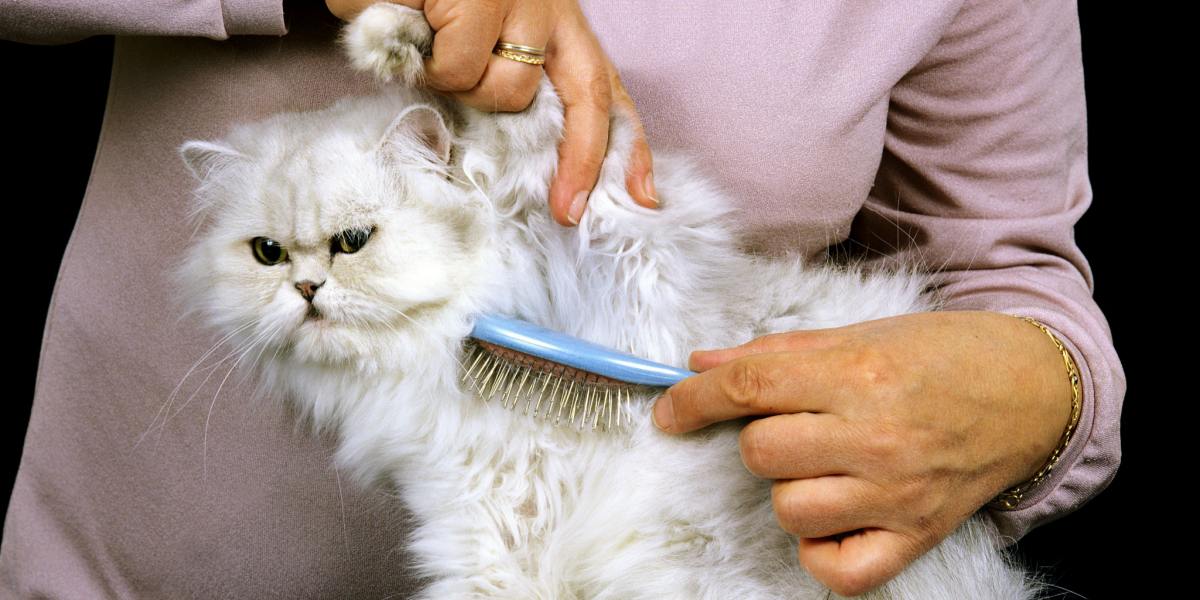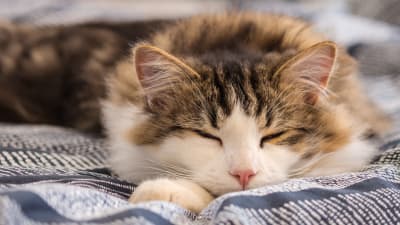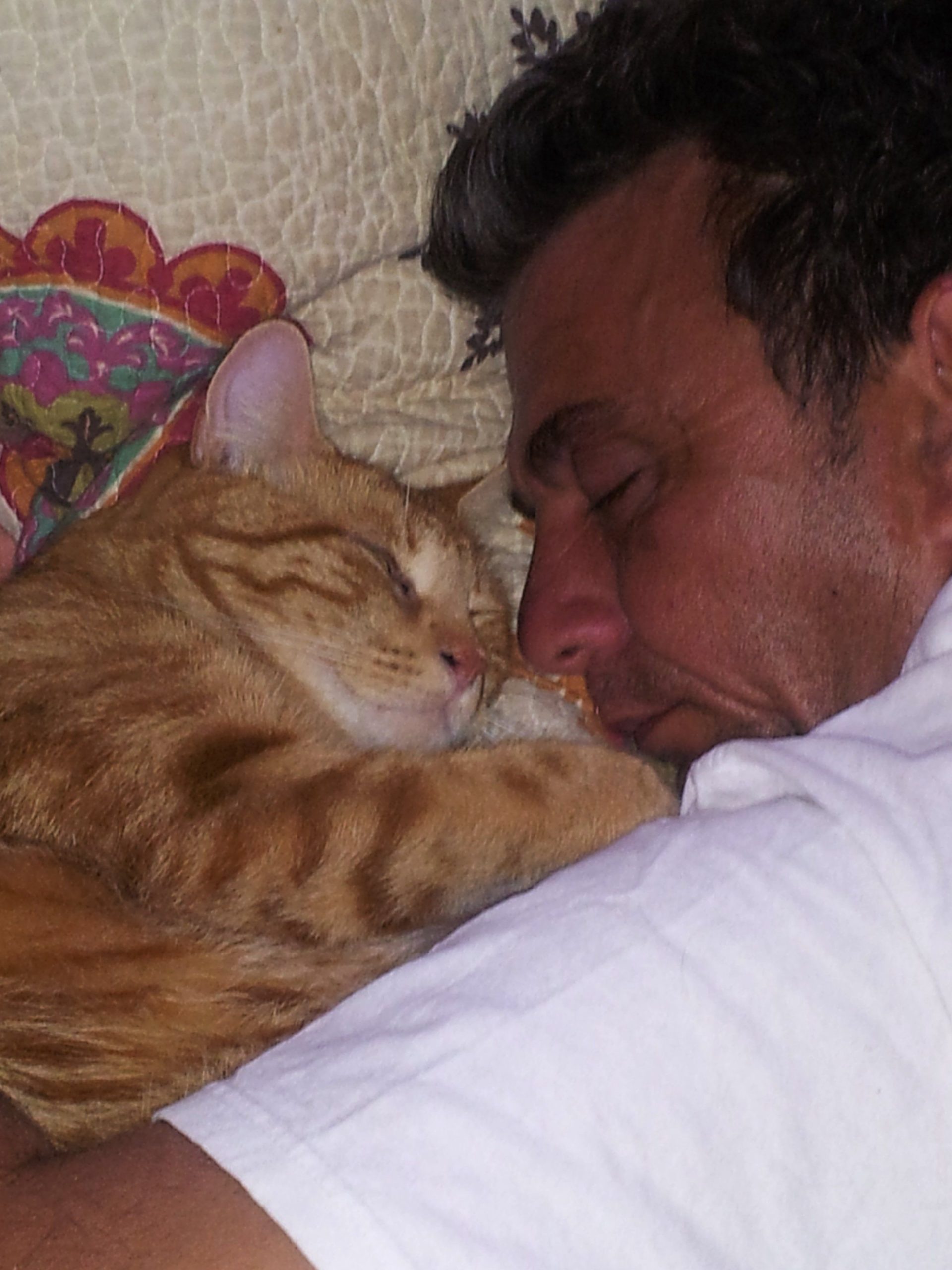Contents
- I. Introduction to Persian Cats
- II. Understanding the Sleep Patterns of Persian Cats
- III. Factors Affecting the Sleep Patterns of Persian Cats
- IV. Common Sleep Habits of Persian Cats
- V. How Much Do Persian Cats Sleep?
- VI. How Much Sleep is Considered Normal for Persian Cats?
- VII. Signs of Excessive Sleep in Persian Cats
- VIII. Health Issues that Can Affect the Sleep Patterns of Persian Cats
- IX. Tips for Ensuring a Good Night’s Sleep for Persian Cats
I. Introduction to Persian Cats

Persian cats are one of the most popular and beloved breeds in the world. Known for their long, luxurious coats and sweet personalities, these cats have captured the hearts of many cat lovers. In this section, we will delve into the fascinating world of Persian cats and discover what makes them so special.
The Origin of Persian Cats
Persian cats have a rich history that dates back centuries. It is believed that they originated in Persia (modern-day Iran) and were brought to Europe in the 17th century by explorers and traders. Their distinct appearance and gentle nature quickly made them a favorite among European nobility.
Physical Characteristics
Persian cats are known for their unique physical features. They have a round face with a short nose, expressive eyes, and small, rounded ears. Their most distinguishing feature, however, is their long, thick coat. This luxurious coat requires regular grooming to keep it free from tangles and mats.
Personality Traits
Persian cats are known for their calm and gentle nature. They are often described as affectionate, sweet, and docile. These cats enjoy a peaceful and relaxed environment and are not typically known for their playful or active behavior. They are happiest when they are curled up on a cozy spot, taking a nap.
Caring for Persian Cats
Due to their long coat, Persian cats require regular grooming to keep their fur healthy and tangle-free. This includes daily brushing, occasional bathing, and regular visits to a professional groomer. Additionally, Persian cats need a balanced diet, plenty of fresh water, and regular veterinary check-ups to ensure their overall health and wellbeing.
Conclusion
Persian cats are truly a unique and special breed. Their stunning appearance, sweet temperament, and regal demeanor make them a beloved choice for cat enthusiasts around the world. If you are considering adding a Persian cat to your family, be prepared to dedicate time to their grooming and provide them with the love and care they deserve.
II. Understanding the Sleep Patterns of Persian Cats

Persian cats are known for their luxurious coats, adorable flat faces, and calm demeanor. They are one of the most popular breeds among cat lovers. If you have or are planning to bring a Persian cat into your home, it’s important to understand their sleep patterns and how much sleep is considered normal for them.
1. The Average Sleep Time
Persian cats are champion sleepers. On average, they sleep for 12 to 16 hours a day. This is significantly more than other cat breeds. Due to their relaxed nature and lack of high activity levels, they spend a lot of their time dozing off and resting.
2. Preferred Sleeping Spots
Persian cats have a preference for soft and cozy places to sleep. They enjoy curling up on plush cushions, in their own cat beds, or even on your favorite spot on the couch. Providing them with comfortable and warm sleeping options will ensure they get the quality sleep they need.
3. Daytime vs. Nighttime Sleep
Persian cats are crepuscular, which means they are most active during the dawn and dusk hours. During the day, they may take several short naps, but their most active periods are usually in the early morning and late evening. They are more likely to be awake and playful during these times, so it’s important to engage them in activities during those hours.
4. Factors Affecting Sleep Patterns
Various factors can affect a Persian cat’s sleep patterns. Changes in their environment, such as a new home or the introduction of a new family member, can disrupt their sleep routine. Additionally, health issues or discomfort may also affect their sleep. It’s essential to monitor their behavior and consult a veterinarian if you notice any changes in their sleep habits.
5. Excessive Sleep
While Persian cats are known to sleep a lot, excessive sleep may indicate an underlying health issue. If you observe your Persian cat sleeping significantly more than usual, appearing lethargic, or experiencing weight loss, it’s essential to seek veterinary advice. These symptoms may be a sign of an underlying health problem that needs attention.
Understanding the sleep patterns of Persian cats is crucial for providing them with the care and attention they need. By ensuring they have a comfortable sleeping environment and monitoring any changes in their sleep habits, you can help keep your Persian cat happy and healthy.
III. Factors Affecting the Sleep Patterns of Persian Cats

Persian cats are known for their luxurious coats and calm demeanor. These adorable feline companions spend a significant amount of their time snoozing and lounging around. However, various factors can influence their sleep patterns. Let’s explore some of these factors:
1. Age
Just like humans, Persian cats’ sleep requirements change as they age. Kittens, for example, tend to sleep more than adult cats. As they grow, their energy levels increase, reducing the amount of sleep needed. Older Persian cats may require more rest due to age-related conditions or reduced activity levels.
2. Health
The health of a Persian cat greatly affects its sleep patterns. Cats that are in good physical condition tend to have better sleep quality. On the other hand, if a Persian cat is experiencing pain or discomfort due to an illness or injury, it may struggle to find a comfortable position or be restless during sleep.
3. Environment
A peaceful and comfortable environment plays a vital role in promoting quality sleep for Persian cats. Factors such as noise, temperature, and lighting can disrupt their sleep. Providing a quiet and soothing space, away from loud noises and bright lights, can help create an ideal sleep environment for your Persian cat.
4. Diet and Exercise
The type of diet and exercise routine a Persian cat follows can impact its sleep patterns. A well-balanced diet provides the necessary nutrients to support overall health, including sleep. Regular exercise helps cats burn off excess energy, promoting better sleep. However, avoid stimulating playtime right before bedtime, as it may keep your furry friend awake.
5. Stress and Anxiety
Persian cats are sensitive creatures, and stress or anxiety can affect their sleep patterns. Changes in the household, such as moving to a new home, the arrival of a new pet, or loud noises, can cause stress and disrupt their sleep. Creating a calm and predictable routine can help reduce stress and promote better sleep for your Persian cat.
Understanding the factors that influence the sleep patterns of Persian cats can help provide them with the optimal conditions for restful sleep. By considering their age, health, environment, diet and exercise, and managing stress levels, you can ensure that your Persian cat enjoys a good night’s sleep and wakes up refreshed and ready for a day of lounging and play.
IV. Common Sleep Habits of Persian Cats

Persian cats are known for their luxurious coats and calm demeanor, but they are also notorious for their sleep habits. Understanding their sleep patterns can help you provide the best care for your furry friend. Here are some common sleep habits of Persian cats:
1. Lengthy Naps
Persian cats are champion nappers and can sleep for up to 15 hours a day. This is because they are naturally laid-back and enjoy their relaxation time. Don’t be surprised if you find your Persian cat snoozing in various spots around the house.
2. Daytime Sleepers
Persians are mainly active during the evenings and nights, which means they tend to sleep during the day. They are crepuscular animals, meaning they are most active during dawn and dusk. So, if you work during the day, your Persian cat will likely spend most of their waking hours asleep.
3. Cozy Retreats
When it comes to sleep, Persian cats have a particular affinity for cozy spots. They love soft blankets, plush beds, and warm corners where they can curl up and feel safe. Providing comfortable sleeping areas will ensure that your Persian cat gets enough rest throughout the day.
4. Light Sleepers
Despite their lengthy sleep sessions, Persian cats are light sleepers. They have a keen sense of hearing and can easily wake up at the slightest noise or disturbance. It’s essential to create a quiet and peaceful environment for them to have uninterrupted sleep.
5. Catnaps
While Persian cats may have long napping sessions, they also have shorter bursts of sleep throughout the day. These catnaps typically last for a few minutes to an hour. You may notice your Persian cat dozing off and waking up multiple times during the day.
6. Dreaming Felines
Just like humans, Persian cats are known to dream during their sleep. You may observe their paws twitching, whiskers moving, or even hear them softly mewing. It’s a delightful sight to witness and shows that they are in a deep sleep state.
7. Sleep Positions
Persian cats have a variety of sleep positions. They may sleep on their sides, curled up in a ball, or even sprawled out on their backs with their paws in the air. These positions not only showcase their flexibility but also indicate their comfort and relaxation.
Understanding and respecting the sleep habits of your Persian cat is crucial for their overall well-being. Ensure that they have a cozy and quiet sleeping environment, provide them with comfortable bedding, and allow them to have uninterrupted sleep. By doing so, you’ll have a happy and well-rested feline companion by your side.
V. How Much Do Persian Cats Sleep?
Persian cats are known for their luxurious coats, adorable flat faces, and calm temperament. But one aspect of their behavior that often surprises people is their love for sleep. Persian cats are champion sleepers and can spend up to 14 to 16 hours a day snoozing away. Let’s dive deeper into the sleeping habits of these furry felines.
1. The Importance of Sleep for Persian Cats
Just like humans, sleep plays a vital role in maintaining overall health and well-being for Persian cats. During sleep, their bodies repair and rejuvenate, helping them stay healthy and active. Adequate rest also contributes to their mental and emotional well-being.
2. Factors Affecting Sleep Patterns
Several factors can influence the sleep patterns of Persian cats. Age, health, and activity levels can play a role in determining how much sleep they need. Kittens and senior cats tend to sleep more than adult cats. Additionally, if a Persian cat leads a sedentary lifestyle, they may require more sleep compared to an active cat.
3. Creating the Perfect Sleep Environment
To ensure your Persian cat gets quality sleep, it’s essential to create a comfortable sleep environment. Provide a cozy bed or cushioned area where they can curl up and snooze undisturbed. Keep the sleeping area in a quiet corner of your home, away from any loud noises or disturbances.
4. Signs of Excessive Sleep
While Persian cats are known for their love of sleep, excessive sleeping can sometimes be a sign of an underlying health issue. If you notice a sudden increase in your cat’s sleep time or if they appear lethargic even when awake, it’s crucial to consult a veterinarian to rule out any potential health problems.
5. Maintaining a Balance
While Persian cats need plenty of sleep, it’s equally important to provide them with mental and physical stimulation when they are awake. Engage them in play sessions, provide interactive toys, and create opportunities for exercise. Finding a balance between rest and activity will ensure your Persian cat leads a healthy and fulfilling life.
VI. How Much Sleep is Considered Normal for Persian Cats?
Persian cats are known for their luxurious coats and calm demeanor. They are often referred to as the “sofa cats” because they love to lounge around and take long naps. But how much sleep is considered normal for these feline beauties?
1. Sleep Patterns of Persian Cats
Like most cats, Persian cats are crepuscular animals, which means they are most active during dawn and dusk. However, they are also known for being big sleepers. On average, a Persian cat sleeps anywhere from 12 to 16 hours a day. This is significantly more than the average sleep duration for other cat breeds.
2. Factors Affecting Sleep Duration
Several factors can influence how much a Persian cat sleeps. Age, health, and activity level are some of the key factors to consider. Kittens and senior cats tend to sleep more than adult cats. Cats that are sick or recovering from an illness may also sleep more to conserve energy and heal faster. Similarly, if a Persian cat has had a particularly active day, they may need more sleep to recover.
3. The Importance of Sleep for Persian Cats
Sleep plays a crucial role in the overall well-being of Persian cats. It allows their bodies to rest and rejuvenate, promotes healthy brain function, and helps regulate their immune system. During sleep, cats also go through different sleep stages, including REM sleep, which is essential for memory consolidation and learning.
4. How to Ensure Your Persian Cat Gets Enough Sleep
Creating a conducive sleep environment is important to ensure your Persian cat gets enough rest. Provide a comfortable and cozy bed or sleeping area where they can retreat to. Make sure the space is quiet and free from disturbances. Establish a regular sleep routine by keeping a consistent feeding and playtime schedule.
5. When to Be Concerned
While Persian cats are known for their love of sleep, it’s essential to monitor their sleep patterns for any changes. If you notice a significant increase or decrease in their sleep duration, it may indicate an underlying health issue. Excessive sleepiness or difficulty sleeping should also be evaluated by a veterinarian.
VII. Signs of Excessive Sleep in Persian Cats
Persian cats are known for their love of sleep and can often be found snoozing for hours on end. However, there are times when excessive sleep may indicate a potential health issue. It’s important for cat owners to be aware of the signs that may indicate an underlying problem.
1. Lethargy and Lack of Energy
If your Persian cat is excessively sleeping and also displays a lack of energy or seems unusually lethargic, it could be a sign of an underlying health condition. Pay attention to any changes in their behavior or activity levels.
2. Loss of Appetite
While it’s normal for cats to sleep after a meal, a significant decrease in appetite coupled with excessive sleep could be a cause for concern. If your Persian cat is sleeping excessively and showing no interest in food, it’s important to consult a veterinarian.
3. Weight Loss or Gain
Changes in weight can be a sign of an underlying health issue. If your Persian cat is sleeping excessively and experiencing sudden weight loss or gain, it’s essential to seek veterinary advice to rule out any medical conditions.
4. Changes in Litter Box Habits
Excessive sleep coupled with changes in litter box habits, such as urinating or defecating outside the litter box or having difficulty using it, can indicate a potential health problem. Monitor your cat’s litter box behavior and consult a veterinarian if any changes occur.
5. Abnormal Breathing Patterns
If your Persian cat is excessively sleeping and displaying abnormal breathing patterns, such as wheezing, coughing, or difficulty breathing, it may be a sign of a respiratory issue. Seek immediate veterinary attention to ensure your cat’s well-being.
Remember, while Persian cats are known for their love of sleep, it’s important to observe their behavior and monitor for any signs of excessive sleep that may indicate an underlying health problem. As a responsible pet owner, it’s crucial to seek veterinary advice if you have any concerns about your cat’s sleep patterns or overall well-being.
VIII. Health Issues that Can Affect the Sleep Patterns of Persian Cats
Persian cats are known for their luxurious coats and calm demeanor. These elegant felines are loved by many, but they can also face certain health issues that may disrupt their sleep patterns. It is important for cat owners to be aware of these potential problems and take appropriate measures to ensure their Persian cats get the restful sleep they need.
1. Respiratory Problems
Persian cats are brachycephalic, meaning they have a flat face and a compressed airway. This anatomical feature can make them more susceptible to respiratory issues such as snoring, wheezing, and difficulty breathing. These problems can disrupt their sleep and result in less restorative rest. Regular vet check-ups and proper grooming can help prevent or manage these issues.
2. Eye Conditions
Persian cats are prone to various eye conditions, including excessive tearing, conjunctivitis, and entropion (inwardly turned eyelids). These eye problems can be uncomfortable and cause irritation, leading to disrupted sleep. Regular eye care and cleaning are essential in preventing and managing these conditions, helping the cats sleep more peacefully.
3. Dental Disease
Poor dental hygiene can lead to painful dental disease in Persian cats. Tooth decay, gum infections, and oral pain can make it difficult for them to eat and sleep comfortably. Regular brushing, dental check-ups, and a balanced diet can help maintain good oral health and prevent these issues from affecting their sleep patterns.
4. Obesity
Persian cats have a tendency to gain weight easily, and obesity can lead to various health problems, including sleep apnea. Excess weight can cause the airway to become partially blocked during sleep, leading to snoring and interrupted breathing. A balanced diet, portion control, and regular exercise are crucial in preventing obesity and promoting healthy sleep habits.
5. Stress and Anxiety
Just like humans, Persian cats can experience stress and anxiety, which can impact their sleep. Changes in the environment, separation from their owners, or the introduction of new pets can all trigger stress in these sensitive cats. Providing a calm and secure environment, offering plenty of playtime and affection, and using natural remedies if necessary can help alleviate anxiety and promote better sleep.
By addressing these health issues and providing appropriate care, Persian cat owners can ensure that their beloved pets enjoy restful and rejuvenating sleep. Understanding the specific needs of Persian cats and taking proactive measures can help them lead healthier and happier lives.
IX. Tips for Ensuring a Good Night’s Sleep for Persian Cats
Getting a good night’s sleep is essential for any living being, including our furry friends. Persian cats are known for their love of sleep, but sometimes they can struggle to get a restful night’s sleep. Here are some tips to ensure your Persian cat gets the sleep they need:
1. Create a Calm and Comfortable Environment
Just like humans, Persian cats need a peaceful environment to sleep well. Provide a cozy bed or blanket in a quiet area of your home where they can retreat to for uninterrupted sleep. Make sure the room is at a comfortable temperature and minimize any noise or distractions that might disturb their sleep.
2. Establish a Bedtime Routine
Persian cats thrive on routine, so establishing a bedtime routine can help signal to them that it’s time to sleep. Create a consistent schedule for feeding, playtime, and bedtime. Engage them in some calming activities, such as gentle brushing or interactive play, before bed to help them wind down.
3. Provide Mental and Physical Stimulation
Ensuring your Persian cat gets enough mental and physical stimulation during the day can help them sleep better at night. Engage them in interactive playtime with toys or provide scratching posts and climbing trees to keep them active. This way, they’ll be tired and ready to sleep when bedtime comes around.
4. Avoid Late-Night Stimulants
Just like coffee can keep us awake, certain stimulants can disrupt a cat’s sleep. Avoid feeding your Persian cat stimulating foods or treats close to bedtime. Additionally, minimize their exposure to bright lights or screens before bed, as this can interfere with their natural sleep-wake cycle.
5. Keep Up with Regular Vet Check-ups
Health issues can also affect a cat’s sleep patterns. Make sure your Persian cat is up to date with their vaccinations and regular vet check-ups. Discuss any concerns about their sleep with your veterinarian, as they can provide valuable insights and advice.
By following these tips, you can help your Persian cat enjoy a restful and rejuvenating night’s sleep, ensuring they wake up refreshed and ready to tackle the day ahead.

Jackson is an accomplished content writer with a flair for captivating storytelling. With a Bachelor’s degree in English Literature from the prestigious University of California, Berkeley, Hunter’s educational background has honed his writing skills to perfection. His love for felines is evident in his extensive knowledge of cat behavior and care, making him an expert in the field. Hunter’s passion for cats has led him to contribute insightful articles to various online platforms, providing valuable information and tips to cat owners worldwide. With his exceptional writing abilities and deep understanding of cats, Hunter continues to create engaging content that resonates with readers and leaves a lasting impact.
